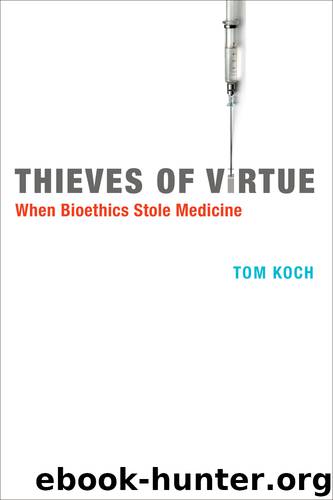Thieves of Virtue by Tom Koch

Author:Tom Koch [Koch, Koch]
Language: eng
Format: epub
ISBN: 9780262304603
Publisher: MIT Press
Published: 2012-04-07T04:00:00+00:00
Figure 7.4
Dale and Leanne Froese are working members of the Canadian Down Syndrome Society. Dale argues that the assumption that their lives must be less because of Down syndrome, and their burden on family and society greater, is wrong. Source: Canadian Down Syndrome Society (CDSS).
That is precisely the perspective McBryde Johnson argued and Sacks articulated across their respective works. Froese sees himself as no more or less a member of the community than, for example, John Harris or Pete Singer. Froese engages the world to the best of his ability and that is the only thing that should be important. “I know people I am serving [at work] treat me a little differently. I am tolerant of this,” he writes, “and try to change their perspectives by confidently completing my duties.” Here one sees what to Singer was weird but was beautiful to McBryde Johnson. Froese is, as was McBryde Johnson, tolerant of those who see a personal characteristic as necessarily limiting. His response, like hers, is to be in the world and to interact with it, insisting in his (or her) embodied presence not his (or her) individual importance but the importance of relationships among those with whom he (or she) interacts in their respective communities.
Here one moves close to the heart of the matter. McBryde Johnson did not minimize the limits of her physicality. She simply insisted they were irrelevant to her personhood within the community of persons with whom she lived. For his part, Froese says the same about himself in his world. Froese serves food. McBryde Johnson worked as a lawyer. Neither the trebling of Froese’s chromosome nor the eccentricities of McBryde Johnson’s spine made them lesser persons in their communities. Their cognitive and physical characteristics had no fundamental bearing on the essential worthiness of the lives either led within a community of family and friends.
McBryde Johnson was clear about this in an undated piece asking, “When is life worth living?” She wrote: “I can undertake work that doesn’t feed anyone’s bottom line but satisfies my curiosity, my vision of justice, my sense of fun. Yet still, I have enough money to get everything I need and most of what I want.” How many people with mundane physical traits can say as much? There is no shame (that most social of sentimentalities) in needing help or being limited in a way that requires assistance and, as McBryde Johnson wrote, “Without shame, there’s no humiliation.” Whether one has the physicality of McBryde Johnson or the cognitive abilities of Dale Froese the same is true. Shame, humiliation, and the emotional suffering that result are the consequence of being seen as a lesser being by dint of dependence, or difference. It is the disability that Brody described, one not inherent in the person but visited upon him or her by the prejudice of others who see them as, in Sacks’s language, “unpeople.”
Here, too, one may see a Kantian perspective, albeit different from the one that pretends to inform most bioethics.
Download
This site does not store any files on its server. We only index and link to content provided by other sites. Please contact the content providers to delete copyright contents if any and email us, we'll remove relevant links or contents immediately.
| Administration & Medicine Economics | Allied Health Professions |
| Basic Sciences | Dentistry |
| History | Medical Informatics |
| Medicine | Nursing |
| Pharmacology | Psychology |
| Research | Veterinary Medicine |
Periodization Training for Sports by Tudor Bompa(8224)
Why We Sleep: Unlocking the Power of Sleep and Dreams by Matthew Walker(6668)
Paper Towns by Green John(5146)
The Immortal Life of Henrietta Lacks by Rebecca Skloot(4558)
The Sports Rules Book by Human Kinetics(4355)
Dynamic Alignment Through Imagery by Eric Franklin(4184)
ACSM's Complete Guide to Fitness & Health by ACSM(4030)
Kaplan MCAT Organic Chemistry Review: Created for MCAT 2015 (Kaplan Test Prep) by Kaplan(3979)
Introduction to Kinesiology by Shirl J. Hoffman(3748)
Livewired by David Eagleman(3736)
The Death of the Heart by Elizabeth Bowen(3585)
The River of Consciousness by Oliver Sacks(3580)
Alchemy and Alchemists by C. J. S. Thompson(3487)
Bad Pharma by Ben Goldacre(3401)
Descartes' Error by Antonio Damasio(3252)
The Emperor of All Maladies: A Biography of Cancer by Siddhartha Mukherjee(3122)
The Gene: An Intimate History by Siddhartha Mukherjee(3080)
The Fate of Rome: Climate, Disease, and the End of an Empire (The Princeton History of the Ancient World) by Kyle Harper(3039)
Kaplan MCAT Behavioral Sciences Review: Created for MCAT 2015 (Kaplan Test Prep) by Kaplan(2965)
